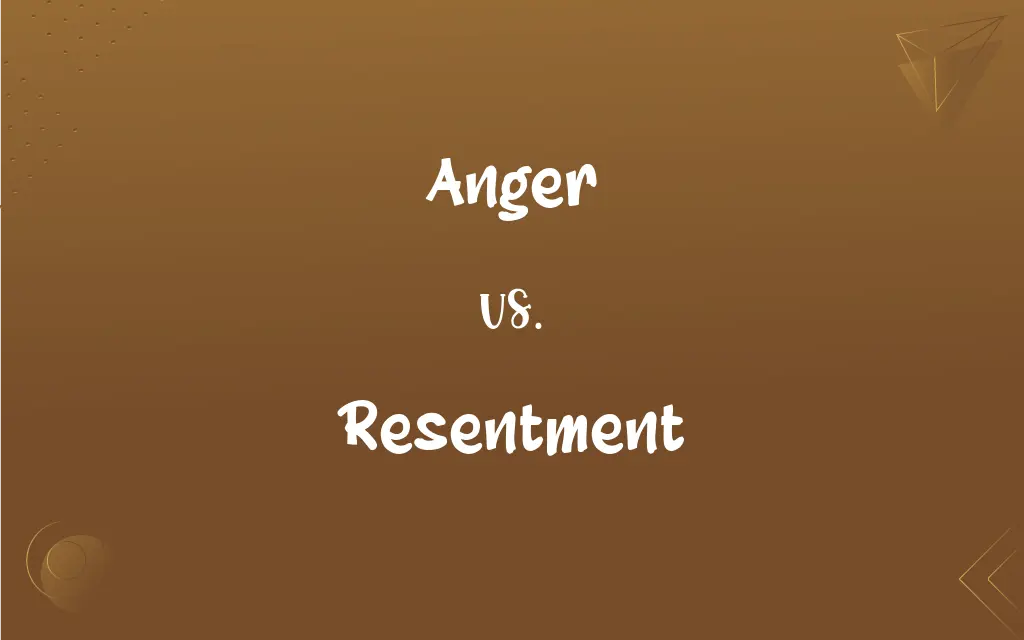Anger vs. Resentment: What's the Difference?
Edited by Harlon Moss || By Janet White || Published on December 4, 2023
Anger refers to a strong feeling of displeasure or hostility. Resentment refers to bitter indignation at having been treated unfairly.

Key Differences
Anger is an intense emotional response to perceived provocation or injustice. Resentment, however, is a deeper, more enduring feeling of bitterness and ill-will, often stemming from prolonged feelings of being wronged or slighted.
While anger is usually a more immediate and often explosive reaction, resentment tends to simmer quietly, potentially for a long time. Anger can dissipate relatively quickly, but resentment may linger and fester.
Anger can be directed at a wide range of targets, including people, situations, or even oneself. Resentment, by contrast, is usually directed at specific people or entities believed to have caused personal harm or injustice.
The expression of anger is typically more visible and outward, such as shouting or physical aggression. Resentment is often internalized, leading to grudges and a lasting sense of bitterness.
Anger can sometimes be resolved through confrontation or expression. Resentment, however, often requires deeper introspection and a longer process of resolution, potentially involving forgiveness.
ADVERTISEMENT
Comparison Chart
Nature
Immediate, explosive
Long-lasting, simmering
Duration
Often short-lived
Can persist for a long time
Target
Broad, varied
Specific, personal
Expression
Outward and visible
Internalized, often silent
Resolution
Through expression or confrontation
Requires introspection, forgiveness
ADVERTISEMENT
Anger and Resentment Definitions
Anger
Anger is a strong feeling of annoyance, displeasure, or hostility.
His rude comment sparked sudden anger in her.
Resentment
In psychology, resentment is an emotional re-experiencing of past injustices.
Her resentment towards her childhood bullies lingered into adulthood.
Anger
Anger can be a passionate emotional response to frustration or injury.
She felt a surge of anger when she saw the injustice.
Resentment
Resentment can be a bitter indignation at having been treated unfairly.
He harbored resentment towards his former partner for the betrayal.
Anger
Anger often involves a desire to retaliate or correct a wrong.
Anger fueled her desire to fight against the unfair policy.
Resentment
Resentment is a feeling of indignant displeasure or persistent ill will at something regarded as a wrong, insult, or injury.
Years of being overlooked at work led to deep resentment.
Anger
In psychology, anger is an affective state that varies in intensity from mild irritation to intense fury.
He struggled to control his anger during the debate.
Resentment
Resentment often involves brooding on a grievance and a desire for vengeance.
His resentment over the lost opportunity grew each day.
Anger
Anger can manifest as a protective response to perceived threats.
His anger was a natural reaction to protect his family.
Resentment
Resentment is sometimes characterized by feelings of bitterness or spite.
Resentment tainted his view of the competition.
Anger
A strong feeling of displeasure or hostility.
Resentment
Indignation or ill will stemming from a feeling of having been wronged or offended.
Anger
To make angry; enrage or provoke.
Resentment
Anger or displeasure stemming from belief that one has been wronged or betrayed by others; indignation.
FAQs
Is resentment more harmful than anger?
Resentment can be more harmful as it is long-lasting and can lead to deep-seated bitterness.
Is it normal to feel anger?
Yes, feeling anger is a normal part of the human emotional spectrum.
How do anger and resentment differ in expression?
Anger is often expressed outwardly, while resentment is typically internalized.
What triggers anger?
Anger can be triggered by perceived injustices, frustrations, or threats.
How do you overcome resentment?
Overcoming resentment often involves forgiveness, understanding, and letting go of past grievances.
Can anger be positive?
Yes, anger can be a motivator for change or a response to defend oneself against threats.
Are anger and resentment linked?
Yes, anger can lead to resentment if it's not addressed or resolved.
Is anger always a negative emotion?
Not always, as it can serve as a signal that something needs to be addressed.
Can childhood experiences influence adult resentment?
Yes, unresolved issues from childhood can contribute to adult resentment.
What role does forgiveness play in resolving resentment?
Forgiveness is often key in resolving resentment and moving past grievances.
Is it possible to feel resentment without being aware of it?
Yes, sometimes resentment can be subconscious until it's brought to attention.
Does culture influence how anger and resentment are expressed?
Yes, cultural norms can greatly influence the expression and acceptance of these emotions.
Can therapy help with managing anger and resentment?
Therapy can be very effective in helping individuals understand and manage these emotions.
Can resentment affect relationships?
Yes, resentment can severely strain or damage relationships.
Can resentment disappear on its own?
Resentment usually requires active effort to understand and resolve underlying issues.
Are there physical symptoms of anger and resentment?
Yes, both can manifest physically, such as through increased heart rate or tension.
Can resentment lead to health problems?
Yes, prolonged resentment can lead to stress-related health issues.
How can anger be managed?
Anger can be managed through techniques like deep breathing, communication, and therapy.
Is it healthy to suppress anger and resentment?
Suppression can lead to negative consequences; it's healthier to address and process these emotions constructively.
Can resentment impact mental health?
Yes, prolonged resentment can lead to issues like depression or anxiety.
About Author
Written by
Janet WhiteJanet White has been an esteemed writer and blogger for Difference Wiki. Holding a Master's degree in Science and Medical Journalism from the prestigious Boston University, she has consistently demonstrated her expertise and passion for her field. When she's not immersed in her work, Janet relishes her time exercising, delving into a good book, and cherishing moments with friends and family.
Edited by
Harlon MossHarlon is a seasoned quality moderator and accomplished content writer for Difference Wiki. An alumnus of the prestigious University of California, he earned his degree in Computer Science. Leveraging his academic background, Harlon brings a meticulous and informed perspective to his work, ensuring content accuracy and excellence.






































































